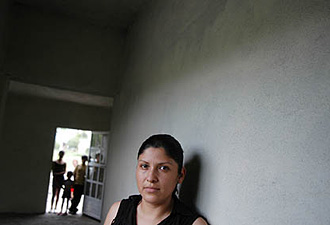 |
 |
 |
 Editorials | July 2007 Editorials | July 2007  
The 'Emigration Widows' of a Mexican Town
 NewsPost NewsPost
go to original


| | (Annie O'Neill/Post-Gazette) |
Hualahuises, a municipality in northern Mexico that appears well on its way to becoming a ghost town thanks to an exodus of workers seeking greener pastures in the US, now has a higher percentage of 'emigration widows' than any other community in the country.

In recent years, this town in the Nuevo Leon state has lost some 2,500 of its 6,400 residents, forcing local officials to seek aid from the federal government to prevent a total loss of population and an increase in the number of abandoned women, Spanish news agency EFE said.

Mayor Gustavo Martinez Platas estimates that 15 percent of the women in Hualahuises are neglected because their men left them to seek better-paying jobs, in majority of the cases, to North Carolina. Most of them forgot about their wives and children, and do not send enough money to cover their basic needs.

A recent Monterrey Institute of Technology study found that only 2 percent of the rural households in Nuevo Leon state receive regular remittances from relatives in the United States.

Official estimates show that between 400,000 and 500,000 Mexican workers cross over illegally to the US each year, seeking a better life than they have at home.

The annual per capita income in Mexico is around $6,250, well below the $44,200 average in the United States, a situation that generates tremendous pressure to emigrate.

Hualahuises is located about 100 km from Monterrey, the capital of Nuevo Leon and a hub of Mexican industry.

But the prosperity of the metropolis has not spilled over to the town. Platas said 30 percent of his city's annual budget of 23 million pesos ($2.1 million) was being spent on free health care for the poor and on education assistance for minors who had been abandoned by their fathers.

'There are many abandoned women, divorced and separated,' in this town, according to the mayor, who belongs to the conservative National Action Party, or PAN, which has held power at the national level since December 2000.

'The men stay to work (in US) and no longer return. They abandon their women, or exchange them for another one that they meet over there,' Platas said.

The mayor blames the high level of male emigration from Hualahuises for the many women who wander around the town, 'many of them alcoholics or unemployed.'

'The town does not create even one job. We have no businesses and the municipal government cannot create jobs on its own,' he said.

To improve the situation, Platas has asked the state government, which is headed by Natividad Gonzalez Paras of the opposition PRI, to do what it can to have a maquiladora (assembly plant) opened in the town 'that can generate 300 jobs.'

'We'd be happy with that,' he said.

Platas also blames the exodus of men on the low salaries in Mexico of around 100 pesos ($9) per day, compared to the $15 an hour that a construction worker can earn in the US.

A maquiladora, according to the mayor, would be a solution, even if only a temporary one, for the abandoned women of this ghost town. | 
 | |
 |



